Bulgaria demonstrates emerging strength in AI-related disciplines but lags in digital readiness and workforce alignment. With low Skills Fit (37.6) and moderate Academic Readiness (56.0), graduates often struggle to meet employer needs. Despite rising demand for digital expertise, limited innovation capacity and structural misalignments hinder economic transformation, highlighting the need for stronger industry partnerships, applied digital training, and research-driven growth.
Welcome to the Bulgaria Spotlight on the QS World Future Skills Index, where we explore higher education’s critical role in shaping the workforce of tomorrow. This tailored resource empowers you to analyse Bulgaria’s future skills supply and demand, benchmark key industry jobs and skills gaps against over 80 countries, and align your higher education system with the skills training required for economic transformation.
Bulgaria performance overview
Bulgaria’s higher education system has the potential to drive economic transformation, yet structural misalignments remain. Its Academic Readiness score (56.0) is supported by strengths in AI-related disciplines, but digital education lags behind, limiting its ability to fully meet industry needs. Meanwhile, Bulgaria’s Future of Work score (61.7) reflects strong employer demand for digital skills, yet its Skills Fit score (37.6) suggests that graduates are not adequately prepared for these roles. Compared to Romania, which has made strides in digital upskilling and workforce adaptability, Bulgaria faces greater challenges in ensuring that education translates into economic opportunity. Without targeted reforms in digital curricula and industry collaboration, Bulgaria risks falling behind in high-value job creation and talent retention. Strengthening university-business partnerships and integrating applied digital training will be essential to closing these gaps.
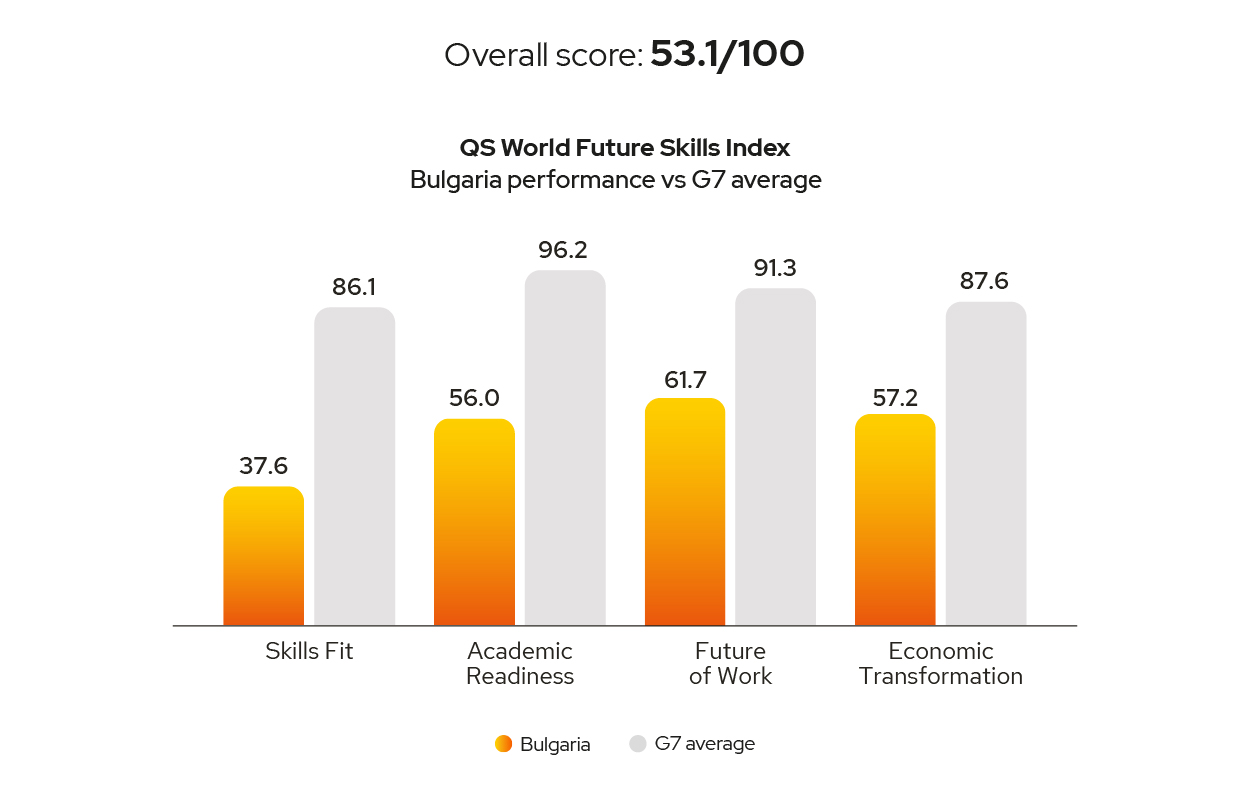
About the indicators
Skills Fit
The Skills Fit indicator measures how well countries are equipping graduates with the skills that employers desire. This is assessed by determining the gap between what employers find important and their level of satisfaction with the skills provided by graduates. This is done using data from the QS Global Employer Survey, the largest of its kind, and data from the World Bank Group. Since 2021, over 100,000 employers have rated the importance of certain skills and their satisfaction in their graduate hires.
Future of Work
The Future of Work indicator evaluates a country’s readiness to recruit for the skills needed in the jobs of tomorrow. Specifically, it measures how well the job market is prepared to meet the growing demand for digital, AI, and green skills, all of which are becoming critical as economies transition towards technology-driven and sustainable industries.
Academic Readiness
This dimension measures how well a country is prepared for the future of work. We look at the number of universities assessed for the QS World University Rankings by Subject, and how they perform. We then measure this in tandem with population size – if a country has a large population but few well-ranked institutions, for example, the country will be penalised.
Economic Transformation
Economic Transformation uses a weighted formula to assess a country’s readiness to support the growth and future of work and skills by examining various key indicators. The Index highlights whether a country has the infrastructure, investment power, and talent available to transition to industries driven by AI, digital transformation, green technologies, and high-skilled work, using data from the World Bank Group, UNESCO Institute for Statistics and the Education Policy Institute
Bulgaria performance in detail
Skills Fit
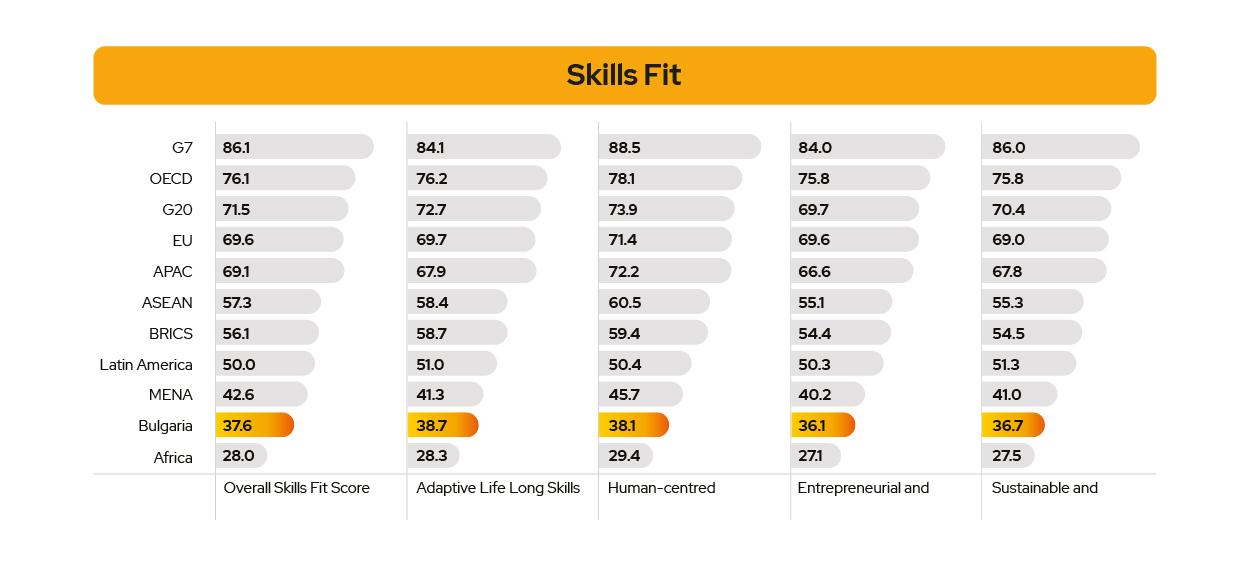
Bulgaria’s Skills Fit score (37.6) highlights the need to strengthen lifelong learning and workplace adaptability. With the OECD stating that 50% of jobs are at risk of automation, universities can play a key role in equipping graduates with Adaptive Lifelong Skills (38.7) to navigate career shifts. However, low Entrepreneurial & Innovative Mindset (36.1) suggests a gap in problem-solving and adaptability within companies. Strengthening industry-aligned learning and embedding real-world collaboration in university curricula will be crucial to preparing graduates for the evolving job market.
Future of Work
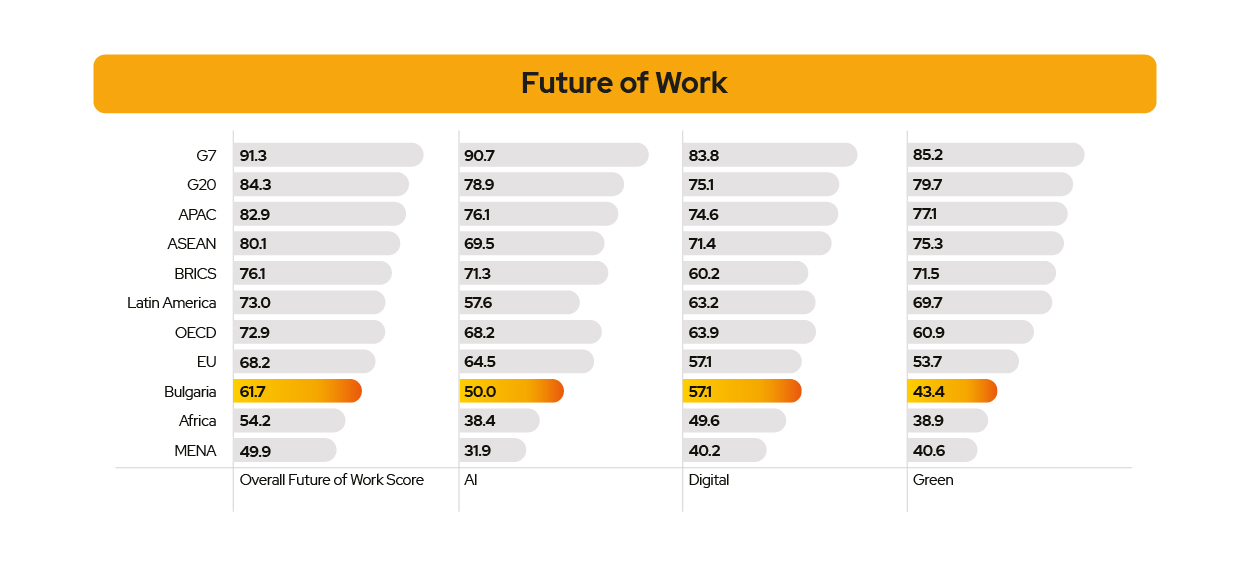
Bulgaria’s Future of Work score (61.7) highlights a limited demand from businesses for AI, Digital, and Green expertise, alongside a mismatch between employer expectations and workforce preparedness. The relatively low score in digital skills (57.1) suggests that businesses have yet to fully embrace digital transformation and the Skills Fit score (37.6) indicates that graduates are not fully equipped with skills that employers seek. This dual challenge risks slowing Bulgaria’s productivity and innovation. To address this, universities must enhance digital curricula and industry-driven training and foster stronger employer recognition of the value of specialist expertise.
Academic Readiness
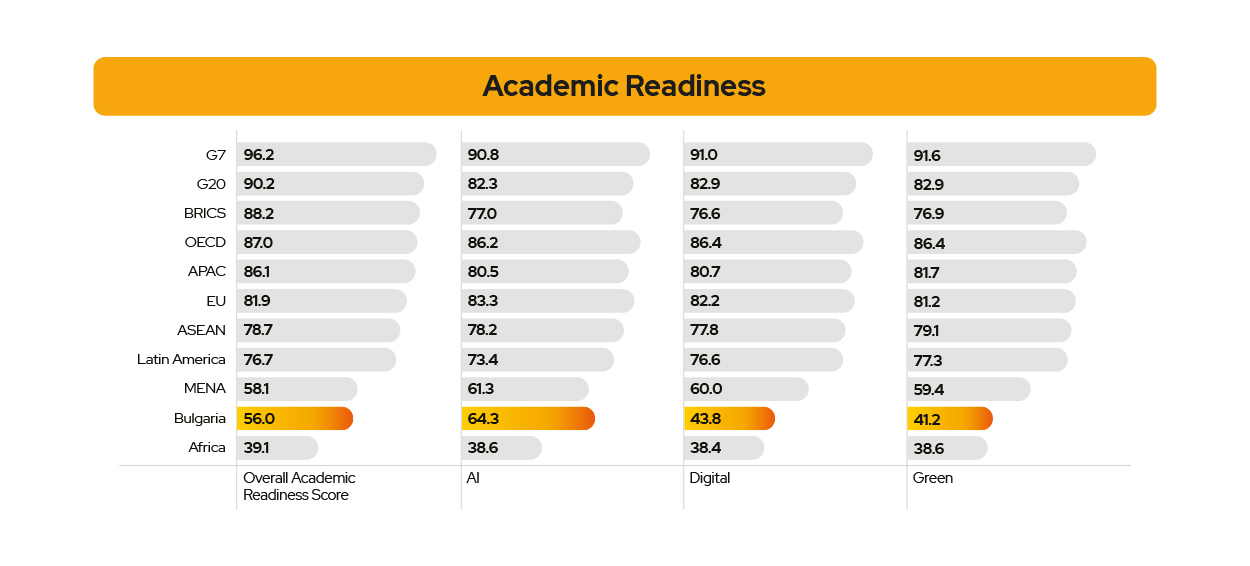
Universities in the country demonstrate emerging strength in AI (64.3) but lag in Digital (43.8), despite employer demand for digital expertise. This suggests that academic programmes must better reflect the digital transformation needs of the economy. With growing demand across Europe for AI and digital specialists, universities have an opportunity to expand interdisciplinary digital training and enhance collaboration with industry to embed job-relevant digital skills into curricula. Further investment in applied research and employer-linked education will be critical to aligning academic readiness and the economy’s transformation trajectory.
Economic Transformation
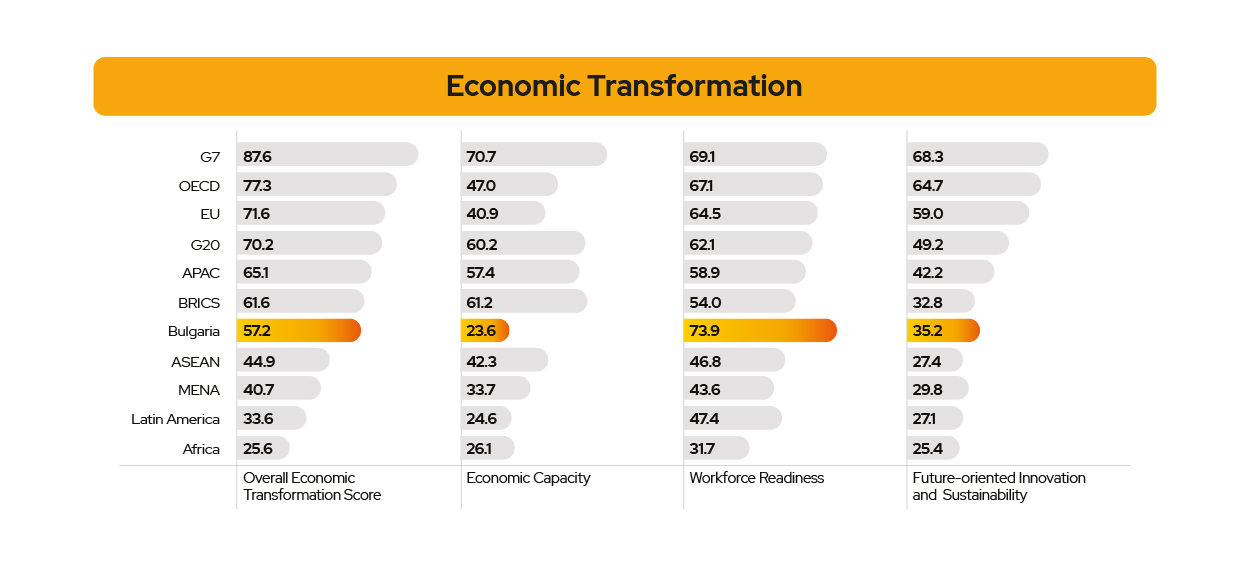
The Economic Transformation score (57.2) highlights an economy in transition, where Workforce Readiness (73.9) is strong, but Economic Capacity (23.6) is weak. To remain competitive, Bulgaria must shift from a low-labour-cost model to a high-productivity workforce, especially given pressures of emigration and an ageing population. However, Future-Oriented Innovation & Sustainability (35.2) indicates that research is not yet driving industry growth at scale. Bulgaria lags behind neighbouring economies, which have invested more in aligning higher education with innovation-led job creation. Universities need to strengthen business partnerships, scale digital and automation training, and ensure applied research translates into workforce-ready skills.
Conclusion and analysis
Bulgaria’s higher education system faces structural misalignments that limit its ability to meet industry needs. Academic Readiness (56.0) is lower than many European peers, particularly in Digital (43.8), despite employer demand (Future of Work: 61.7). However, Skills Fit (37.6) suggests graduates lack the expertise businesses require. To transition from a low-labour-cost to a high-productivity economy, Bulgaria must modernise curricula, strengthen university-business partnerships, and enhance digital skills training, ensuring higher education supports workforce development and long-term economic resilience.
Our analysis and recommendations:
- Bulgaria’s higher education system has the potential to fuel economic transformation. By expanding R&D investment, integrating innovation-led teaching, and supporting university spin-offs, institutions can play a direct role in job creation.
- To accelerate future skills adoption, AI, Digital, and Green programmes should align with employer needs. Links between academia and industry, work-based learning, and research-commercialisation will ensure graduates contribute effectively to the economy.
- Bulgaria has an opportunity to position itself as a hub for tech-driven talent. Investing in knowledge-based sectors, fostering digital transformation, and incentivising graduate retention will be key to unlocking sustainable growth.









.jpg)











